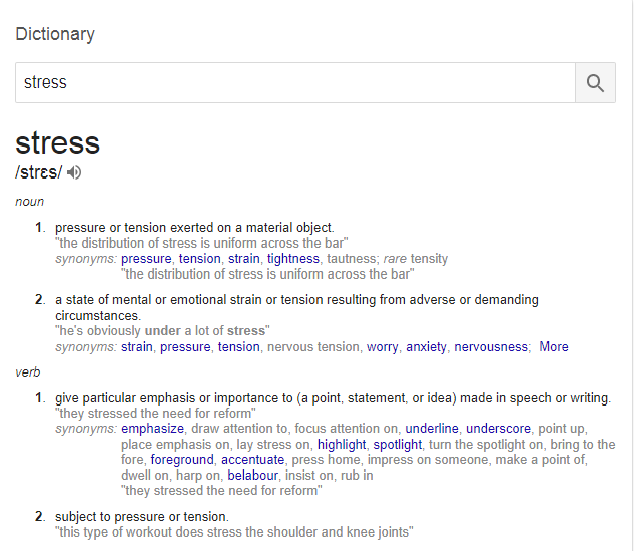What is stress? and all about stress.
What Is Stress?
This is what Google dictionary says:

Stress is your body's way of responding to any kind of demand. It can be caused by both good and bad experiences. When people feel stressed by something going on around them, their bodies react by releasing chemicals into the blood. These chemicals give people more energy and strength, which can be a good thing if their stress is caused by physical danger. But this can also be a bad thing, if their stress is in response to something emotional and there is no outlet for this extra energy and strength. This class will discuss different causes of stress, how stress affects you, the difference between 'good' or 'positive' stress and 'bad' or 'negative' stress, and some common facts about how stress affects people today.

Fast facts on stress:
Here are some key points about stress.
Stress helps the body prepare to face danger.
The symptoms can be both physical and psychological.
Short-term stress can be helpful, but long-term stress is linked to various health conditions.
We can prepare for stress by learning some self-management tips.
stress is not necessarily a ‘bad’ thing. Without this brilliant ability to feel stress, humankind wouldn’t have survived. Our cavemen ancestors, for example, used the onset of stress to alert them to a potential danger, such as a sabre-toothed tiger.
Stress is primarily a physical response. When stressed, the body thinks it is under attack and switches to ‘fight or flight’ mode, releasing a complex mix of hormones and chemicals such as adrenaline, cortisol and norepinephrine to prepare the body for physical action. This causes a number of reactions, from blood being diverted to muscles to shutting down unnecessary bodily functions such as digestion.
Through the release of hormones such as adrenaline, cortisol and norepinephrine, the caveman gained a rush of energy, which prepared him to either fight the tiger or run away. That heart pounding, fast breathing sensation is the adrenaline; as well as a boost of energy, it enables us to focus our attention so we can quickly respond to the situation.
In the modern world, the ‘fight or flight’ mode can still help us survive dangerous situations, such as reacting swiftly to a person running in front of our car by slamming on the brakes.
The challenge is when our body goes into a state of stress in inappropriate situations. When blood flow is going only to the most important muscles needed to fight or flee, brain function is minimized. This can lead to an inability to ‘think straight’; a state that is a great hindrance in both our work and home lives. If we are kept in a state of stress for long periods, it can be detrimental to our health. The results of having elevated cortisol levels can be an increase in sugar and blood pressure levels, and a decrease in libido.
Types of Stress:
Survival Stress - You may have heard the phrase "fight or flight" before. This is a common response to danger in all people and animals. When you are afraid that someone or something may physically hurt you, your body naturally responds with a burst of energy so that you will be better able to survive the dangerous situation (fight) or escape it all together (flight). This is survival stress.

Internal Stress - Have you ever caught yourself worrying about things you can do nothing about or worrying for no reason at all? This is internal stress and it is one of the most important kinds of stress to understand and manage. Internal stress is when people make themselves stressed. This often happens when we worry about things we can't control or put ourselves in situations we know will cause us stress. Some people become addicted to the kind of hurried, tense, lifestyle that results from being under stress. They even look for stressful situations and feel stress about things that aren't stressful.

Environmental Stress - This is a response to things around you that cause stress, such as noise, crowding, and pressure from work or family. Identifying these environmental stresses and learning to avoid them or deal with them will help lower your stress level.

Fatigue and Overwork - This kind of stress builds up over a long time and can take a hard toll on your body. It can be caused by working too much or too hard at your job(s), school, or home. It can also be caused by not knowing how to manage your time well or how to take time out for rest and relaxation. This can be one of the hardest kinds of stress to avoid because many people feel this is out of their control. Later in this course we will show you that you DO have options and offer some useful tips for dealing with fatigue.

Diagnosis, treatment, and management:

How Does Stress Affect You?
Stress can affect both your body and your mind. People under large amounts of stress can become tired, sick, and unable to concentrate or think clearly. Sometimes, they even suffer mental breakdowns.
Changes to the body
Stress slows normal bodily functions, such as the digestive and immune systems. All resources can then be concentrated on rapid breathing, blood flow, alertness, and muscle use.
The body changes in the following ways during stress:
blood pressure and pulse rate rise
breathing is faster
the digestive system slows down
immune activity decreases
the muscles become tense
a heightened state of alertness prevents sleep
Symptoms
Physical effectsof stress on the body can include:
sweating
pain in the back or chest
cramps or muscle spasms
erectile dysfunction and loss of libido
fainting
headache
heart disease
high blood pressure
lower immunity against diseases
muscular aches
nervous twitches
pins and needles
sleeping difficulties
stomach upset
A 2012 study suggested that the stressors experienced by parents, such as financial troubles or managing a single-parent household, can lead to obesity in their children.
Emotional reactions can include:
anger
anxiety
burnout
concentration issues
depression
fatigue
a feeling of insecurity
forgetfulness
irritability
nail biting
restlessness
sadness
Behaviors linked to stress include:
food cravings and eating too much or too little
sudden angry outbursts
drug and alcohol abuse
higher tobacco consumption
social withdrawal
frequent crying
relationship problems
10 quick and quirky stress busters:
- Bubble gum:
Something as simple as chewing a stick of gum can help relieve mild to moderate stress. It can also make you more alert and help you multi-task, say researchers from Melbourne's Swinburne University and the Wrigley Science Institute in Chicago.

A study found anxiety levels dropped by 17 per cent in mildly stressed people when they chewed gum. Their alertness levels were also found to be 19 per cent higher than non-chewers, and they were 67 per cent more effective when asked to multi-task, too.
- chocolate:
When you want some stress release, don't forget what Swiss scientists call the "chocolate cure". A clinical trial in Lausanne found eating 40 grams of dark chocolate daily for two weeks reduced the stress hormone cortisol in people who reported feeling "highly stressed".

The antioxidants and other tasty ingredients in dark chocolate also improved metabolism and healthy gut bacteria. Unfortunately, eating more chocolate won't further reduce stress – 40 grams a day seems to be the right amount.
3.Pet a cat:
Owning a cat could bring stress levels down enough to reduce your heart attack risk by a third. A 10-year study of 4000 Americans found pets helped relieve stress, with most people who took part in the study owning a cat.

In the study, cat owners were found to have a 30 per cent lower risk of death from heart attack than men and women who didn't own a cat.
4.Write a diary:
Letting off steam by writing down your feelings in a diary or poem can avoid stress build-up, says Dr Matthew Lieberman, a neuroscientist at the University of California. He asked 30 people to write descriptions of distressing pictures and found that writing about the images reduced the amount of activity in the area of the brain that deals with stressful emotions.

- yoga:
Yoga puts the body in a state of deep rest, known to yogis as the relaxation response. Researchers now believe that same response can change how our genes behave for the better when we are faced with stress. They believe that during relaxation, oxygen intake reduces, we exhale more nitric oxide and psychological stress levels drop.

Try this one: standing with your feet together, breathe in and raise both arms sideways until they meet above your head. Place your palms together, exhale and bring your hands down until they're in line with your heart, in a prayer position. Repeat three times.
6.Sing a song:

Thinking of a favorite song and spending a minute or two humming a few verses can halt the stress cycle for a while. My addition here is listen to some really soft music which has a great effect to ease out the stress.
7.balloons:
The act of blowing up a balloon does two important things for stress relief: it makes you breathe deeper, because you have to use your diaphragm, and it makes you breathe more slowly. Both these things activate our parasympathetic nervous system, which reduces our heart rate and relaxes our muscles. It has the same effect as the yoga posture.

8.Walnuts & Peanuts:
A handful of walnuts daily (about 18 walnut halves) helps lower blood pressure, which can rise from stress. Even peanuts are great by the way.

9.Laugh:
You can stop stress in its tracks with a laugh. Just thinking about laughing can start a chain reaction in your body that reduces the stress hormones cortisol, adrenaline and dopac.

"By seeking out positive experiences that make us laugh, we can do a lot with our physiology to stay well."
10.Mother - The greatest of all:

Phoning your mum and hearing her voice is as good as a hug for stress release. When young girls were suddenly put in a stressful situation, the sound of their mum's voice reduced stress hormone levels and boosted levels of the comforting hormone oxytocin.
That's it for today guys. Hope you like this post and it will help you out to kick out the stress.
Please comment below, share, upvote, reply.
Credits:
http://www.stress.org.uk/what-is-stress/
http://www.mtstcil.org/skills/stress-definition-1.html
https://www.medicalnewstoday.com/articles/145855.php
Image credits: https://www.google.co.in/imghp?hl=en&tab=wi